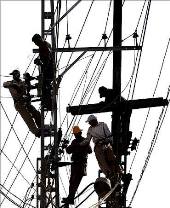 | « Back to article | Print this article |
 Fuel supply risks and precarious financial health of electricity distribution companies continue to pose challenges for the power sector, whose slow progress could impact the country's economic growth, a report said on Wednesday.
Fuel supply risks and precarious financial health of electricity distribution companies continue to pose challenges for the power sector, whose slow progress could impact the country's economic growth, a report said on Wednesday.
India Ratings & Research, part of global major Fitch Group, also cautioned that expected investments worth Rs 1,75,000 crore (Rs 1,750 billion) in various power projects could turn into non- performing assets unless fuel issues are resolved.
"Non-availability of sufficient power as well as insufficient power generation capacity addition could impact the country's overall economic growth," India Ratings & Research Director (Corporates) Salil Garg told PTI in New Delhi.
For every one per cent increase in gross domestic product, the power generation need to increase by one per cent.
Otherwise, there would be inadequate electricity supply that can impact not just the power sector but also other industries.
"The progress of reforms in the power sector is happening at a slow pace. The sector is expected to suffer this year (also) and investors are not likely to be enthused to put money into the sector," Garg noted.
Indian economy is projected to grow at a slower pace, in the range of 5.7-5.9 per cent, this fiscal.
India, which has an installed power generation capacity of over 2,00,000 MW, expects to add about 88,000 MW in the current Five-Year Plan ending March 2017.
The report '2013 Outlook: Indian Power', co-authored by Garg and released today, said that fuel risks -- coal and gas -- along with uncertainties about financial viability of distribution companies (discoms) remain major issues.
Huge tariff hikes -- required to revive discoms -- can't be expected this year as many states have already increased them significantly in recent times, Garg said.
Tamil Nadu has raised tariffs by as much as 27 per cent.
Acute fuel scarcity is already hurting power generation.
Coal India, the largest supplier to power plants, has not inked any Fuel Supply Agreements (FSAs) since FY 2009.
The report said: "The 114 FSAs for plants commissioned post FY09 and likely to be commissioned till FY15 have a total cumulative capacity of 51,000 MW and with letters of assurance quantity of 216 million metric tonnes (mMT).
"Assuming only 65 per cent to be met through domestic coal, Coal India will have to increase its dispatch to the power sector to 436 mMT by FY15 (a Compound Annual Growth Rate of 12 per cent),